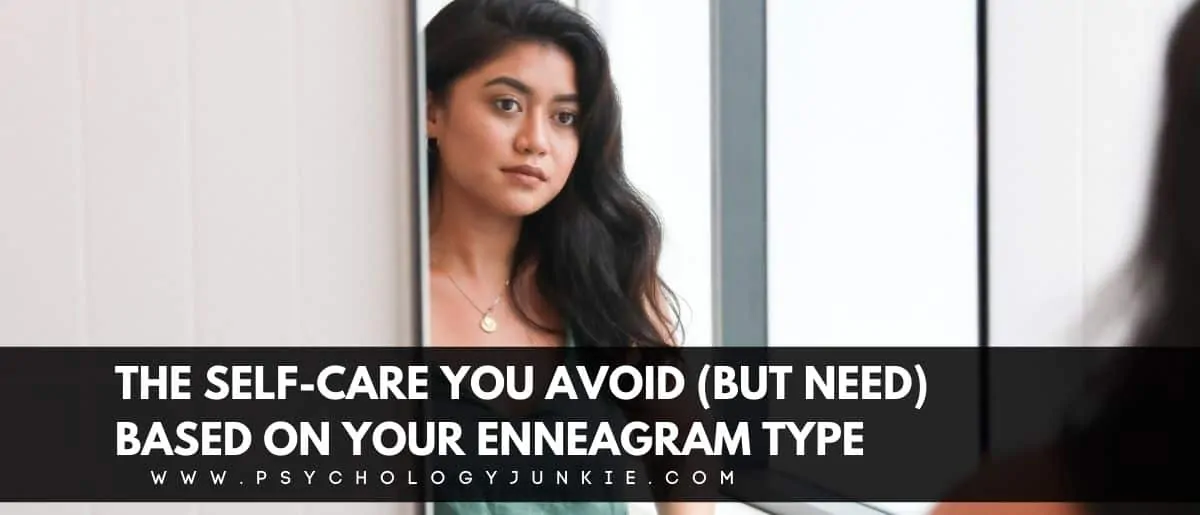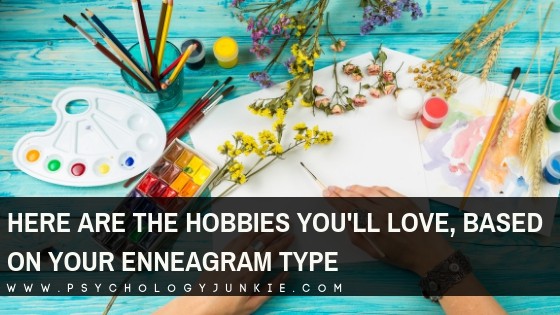The Self Care You Avoid (But Need) Based On Your Enneagram Type
Most of us strive to be the best version of ourselves that we can possibly be. But in our efforts to do that, we tend to fixate on only one direction of growth. Usually the direction we take leads us towards our core desire. Ones will try harder to be more perfect people. Two’s will try to be more selfless and helpful. Threes will try to reach their goals and be more successful.
But are these directions hindering us more than helping us?

Trying to be good, generous, and successful aren’t negative things in and of themselves. But the idolization of those things can lead to relentless feelings of failure, exhaustion, and emptiness. With that in mind, let’s look at the self-care practices each Enneatype really needs to focus on, but may desperately avoid because it goes counter to their core desire.
Find out your Enneagram type with our free Enneagram test!
This article contains affiliate links to books on Amazon. If you purchase one of these books, I get a small kickback that I can use to pay for hosting and other demands of this site. I only recommend books I love.
Table of contents
- The Self-Care You Avoid (But Need), Based On Your Enneatype
- Enneagram One – Show Self-Compassion
- Enneagram Two – Ask for Help
- Enneagram Three – Look for Significance Rather than Success
- Enneagram Four – See What You Have in Common with Others
- Enneagram Five – Reach Out to Others
- Enneagram Six – Stay in the Present
- Enneagram Seven – Process Your Feelings Fully
- Enneagram Eight – Express Your Feelings to Someone
- Enneagram Nine – Say “No”
Estimated reading time: 14 minutes
The Self-Care You Avoid (But Need), Based On Your Enneatype
Enneagram One – Show Self-Compassion
Your core desire is to have integrity and your greatest fear is being corrupt, bad, or defective. Because you’re so driven to be morally right, you get overwhelmed by the evil and imperfections all around you and within you. This tendency can make you judgmental, critical, and plagued by a sense of not being good enough. You may feel trapped in a cycle of perfectionism and self-judgment that leaks out into your relationships. Not only do you chastise yourself for your failures, but you also catch yourself chastising others for their flaws and shortcomings.
Here’s what you need to remember: Kindness motivates everyone to do better. Criticism de-motivates and makes people defensive.
The Dalai Lama once said, “If you don’t love yourself, you cannot love others. You will not be able to love others. If you have no compassion for yourself then you are not capable of developing compassion for others.”
Repeat this to yourself. Accept that you are not perfect. Nobody is. Realize that with each failure, there is an opportunity for growth. But you have to accept that failure and look at it as a gift. Failure is a mentor. It teaches us what not to do in the future, what our temptations, weaknesses, and strengths are. Forgive yourself. View obstacles and failures as opportunities to grow. Take a gratitude walk and think of all the things you appreciate about the people and things around you.
Read This Next: 21 Signs That You’re an Enneagram One Type
Enneagram Two – Ask for Help
Your core desire is to earn love through selflessness. Your core fear is to be unloved for who you really are. You tend to sense other people’s needs before those needs are even verbalized. People don’t need to walk up to you and spell out their struggles and emotions – you have a radar that’s built-in. You pride yourself on being there for other people and helping them without having to be asked. But is that pride really a good thing? And are you trampling over your own needs in an effort to be there for other people?
Asking for help tends to make you feel vulnerable and embarrassed. You want to be the helper, not the person in need. You want to be there for others while keeping yourself invulnerable to needing anyone else.
“Being the first to ask for help in a friendship takes courage and humility.” – Afton Rorvik, Storm Sisters: Friends Through All Seasons
Because you have a natural intuition to other people’s needs, you unconsciously expect other people to have the same insight into your own. When you fail to see your generosity reciprocated, you can feel resentful and bitter – but you refrain from saying so. Instead, you keep helping, keep serving, and trying the same old worn-out techniques that have landed you where you are. Denying your own needs and not getting reciprocal support can leave you mentally and physically depleted.
Here’s the bitter truth: Unless everyone you know is a Two, they aren’t wired like you are. They won’t always have a natural intuition for your needs. But that doesn’t mean they don’t care. They may have hinted at helping you in the past, only to be brushed off with a smile and an “I’ve got this!”
Asking for help takes courage and vulnerability. It means admitting that you don’t know all the answers and all the resources to solve every problem. It expresses a need that you can’t solve from within yourself.
“Asking for help is never a sign of weakness. It’s one of the bravest things you can do. And it can save your life.” – Lily Collins
Read This Next: The Enneagram Type 2 – The Helper
Enneagram Three – Look for Significance Rather than Success
Your core desire is to be worthwhile and successful. Your core fear is that you’re worthless without your successes. Because of this, you tend to chase your ambitions and projects, struggling to pause long enough to self-reflect. When you have fears, you try to dissuade them by accomplishing, working, or climbing some kind of social or corporate ladder.
Here’s the thing: Success dies with you. Significance outlives you. And you can’t have significance without knowing who you really are. Significance requires getting off the treadmill and really assessing your heart. Living with character, integrity, and self-awareness brings satisfaction that no medal or promotion ever could.
“Unfortunately, success is Sisyphean (to mix my Greek myths). The goal can’t be satisfied; most people never feel “successful enough.” The high only lasts a day or two, and then it’s on to the next goal. Psychologists call this the hedonic treadmill, in which satisfaction wears off almost immediately and we must run on to the next reward to avoid the feeling of falling behind. This is why so many studies show that successful people are almost invariably jealous of people who are more successful.” – Arthur C. Brooks, Why Success Won’t Make You Happy
Instead of comparing yourself to an entrepreneur, Instagrammer, or inventor, compare yourself to who you were yesterday – a month ago – ten years ago. Read biographies of people who lived significant lives rather than merely chasing success. Harriet Tubman, Mother Teresa, Martin Luther King Jr – these people left legacies that long outlived their time on earth.
Another important thing to do is to get to know yourself. As a Three it can be easy to focus so completely on outside successes and appearances that you become a stranger to your own soul. Take some time this week to ask yourself these 20 questions that can help you understand yourself more fully.
Read This Next: The Enneagram Type 3 – The Achiever
Enneagram Four – See What You Have in Common with Others
Your core desire is to find yourself and know your identity and unique significance. Because you felt misunderstood and different as a child, you absorbed the idea that being different was a central part of your identity.
Don Richard Riso and Russ Hudson wrote in “The Wisdom of the Enneagram” that Fours “insist on being themselves and on putting their personal stamp on everything. Increasingly, their self-image becomes based on how unlike other people they are…Similarly, the moods that Fours get into are often in marked contrast to their surroundings. (“If others are happy, I feel sad. If others feel sad, I feel like giggling.”) Maintaining feelings unlike those of others reinforces a Four’s identity.” This tendency can eventually lead you to feel isolated, misunderstood, and backed into a corner. It reinforces the 4 core vice of envy – where you look at the world outside and believe that others have it easier or better than you do.
I want to challenge you to look around you and see what you have in common with others. Don’t fight against these differences. Acknowledge them. In what ways are you connected to humanity in general? In what ways are you connected to your friends or family? What similar interests or gifts do you have? What similar burdens do you carry? Doing this might feel uncomfortable at first, but over time it can help you to feel connected, whole, and open to a more broad variety of subjects and people.
Read This Next: The Enneagram Type 4 – The Individualist
Enneagram Five – Reach Out to Others
Your core fear is of being helpless or incompetent and your greatest desire is to be capable. You tend to amass enormous amounts of information and prepare, study, and analyze before acting. People tend to feel untrustworthy and overwhelming to you. You fear that they will drown you in their needs, feelings, and demands. It’s natural for you to withdraw from people so you can find respite in your niche interests. In early life you probably absorbed the idea that you shouldn’t expect support from others. But this mindset can send you on a trajectory of loneliness, inaction, and anxiety.
Brene Brown, an American professor, and social worker has done studies on vulnerability and how it creates connection and contentment in people. She states, “Courage starts with showing up and letting ourselves be seen.” She learned that whole-hearted, joyful people had learned to trust in their worth and were authentic with the people around them. She states, “You are imperfect, you are wired for struggle, but you are worthy of love and belonging.” Remind yourself of this when you feel like withdrawing instead of reaching out to someone.
Look around you. Who can you trust? Who has been there for you in a dependable way? Spend some time with them. Start small and share some of your feelings. Ask for help or advice on something. Allow yourself to sense your heart and your feelings and share them with another person. Make sure that the other person doesn’t try to give you a “pep talk,” just let them be a witness to your authentic self. This will be uncomfortable, especially at first, but if you continue with it you can find yourself living more fully and joyfully. Read “Daring Greatly” by Brene Brown to understand why this is so important.
Read This Next: The Enneagram Type 5 – The Investigator
Enneagram Six – Stay in the Present
Whenever life calms down and you’ve accomplished something you set out to do, your mind starts buzzing with other things you “should” worry about or attend to. Did you leave the stove on? If you don’t file your taxes now will you end up in jail? Is one of your kids getting into mischief that will haunt them for the rest of their lives? If you don’t clean up your bedroom are you a failure? The list auto-restarts the minute you find a moment of calm. Don’t let it.
When you achieve a goal or finish something on your to-do list, take a moment to relax, breathe, and really relish the moment. Visualize a place or picture that brings you peace. Breathe deeply. Meditate. Get in touch with your body. Turn off the inner committee in your mind that likes to overanalyze and catastrophize everything that could go wrong. Allow yourself to rest in the silence. Allow yourself to think only on this present moment.
“Breathe deeply, until sweet air extinguishes the burn of fear in your lungs and every breath is a beautiful refusal to become anything less than infinite.” – D. Antoinette Foy
“Breathe. Let go. And remind yourself that this very moment is the only one you know you have for sure.” – Oprah Winfrey
Being in the present will be challenging at first. Your mind will keep wanting to pull you away to worries and disasters that might befall you if you let yourself relax. But with practice and commitment, this routine can bring you a sense of peace, well-being, and balance. You can begin to have authority over your thoughts instead of them carrying you away into an endless stream of stress.
Read This Next: The Enneagram Type Six – The Loyalist
Enneagram Seven – Process Your Feelings Fully
Your core fear is of being trapped or deprived. You have a serious case of FOMO and the idea of being stuck and unable to pursue possibilities terrifies you. Because of that, you’re consistently seeking diversions, escapes, and satisfaction. You’re good at brainstorming, trying new opportunities, and making life fun and engaging. To some, it may seem like your life is full of joy and excitement. But what many people don’t realize is that you often use these diversions as a way to escape your pain and fear. Unfortunately, this allows pain and anxieties to fester and simmer under the surface. The more you try to avoid your pain the more unmanageable it can become.
It’s important to take time to process your feelings fully. Don Richard Risso and Russ Hudson explain in “The Wisdom of the Enneagram” that for Sevens, “It is not so much that you ignore your negative feelings as that you process them incompletely. You more or less notice them and then want to move on to the next thing. Really allowing things to affect you, to impact you on a deeper level, is not the same as wallowing on negative feelings. On the contrary, letting the events of your life, even the painful ones, touch you deeply will only enrich your experience and make your joy more meaningful and real.”
When you fully process your feelings instead of moving onto a different diversion or possibility you get to know yourself better. You learn the core roots of some of your fears and struggles in life. This can allow you to sidestep those same problems again and it can also help you to more fully know yourself and what your soul really needs in life.
“Your pain needs to be recognized and acknowledged. It needs to be acknowledged and then released. Avoiding pain is the same as denying it.” – Yong Kang Chan
Read This Next: The Enneagram Type 7 – The Enthusiast
Enneagram Eight – Express Your Feelings to Someone
As an Eight, your core fear is of being harmed or controlled by others. You crave freedom and authority over your own life. You tend to be protective of your inner self – worried that if you express vulnerability you will be taken advantage of or laughed at. You want to exude an appearance of strength and invulnerability. Unfortunately, this means that a lot of your grief and pain is left unprocessed and you struggle to get close to people and form trusting meaningful bonds.
One of the steps on the path to a meaningful relationship is authenticity and trust. You can’t get that without opening up about your real self – and that includes your pain. Think of someone you feel safe with, someone you trust without reservation. It could be a family member,a partner, a co-worker, or even a counselor. Let yourself speak about your grief, anger, fear, or other feelings. You don’t like the idea of sitting around feeling sorry for yourself so you will probably feel awkward and uncomfortable when you first start to talk about your feelings but stay with it.
Expressing your feelings adds depth to your relationships, helps you to understand yourself better, and helps you to realize that other people actually do care about you and want to help you. Friends and family members, if they are good ones, will want to know how you are really feeling. They want to be there for you. Let them.
Read This Next: The Enneagram Type 8 – The Challenger
Enneagram Nine – Say “No”
Your core fear is losing yourself and losing your inner harmony. You crave a sense of peace and harmony in your soul – and often you gain this sense of stability when your outer world is in harmony. You might tell yourself that you’ll be fine just as long as the people around you are fine. This can lead you down a path of being a “yes” person. You might agree to things you don’t want to do just so that you aren’t disrupting the flow of harmony. You might struggle to assert yourself and say how you actually feel about something. Forgetting yourself and getting lost in other people’s desires can lead you to a feeling of invisibility and pain.
Take a moment to analyze your life. What do you want? What would you live and die for? What are your passions and ambitions? Have you been smothering these things to keep the peace with the people around you? How could you “wake up” to your own needs, desires, and values. When other people ask you what you want, practice telling them directly without apologies or exceptions. Practice staying aligned with what you want in life and how you actually feel.
“Let today mark a new beginning for you. Give yourself permission to say NO without feeling guilty, mean, or selfish. Anybody who gets upset or expects you to say yes all of the time clearly doesn’t have your best interest at heart. Always remember: You have a right to say no without having to explain yourself. Be at peace with your decisions.” – Stephanie Lahart
Read This Next: The Enneagram Type 9 – The Peacemaker
What Are Your Thoughts?
Did you enjoy this article? Do you have any suggestions or insights to share? Let us know in the comments!
Find out more about your personality type in our eBooks, Discovering You: Unlocking the Power of Personality Type, The INFJ – Understanding the Mystic, The INFP – Understanding the Dreamer, and The INTJ – Understanding the Strategist. You can also connect with me via Facebook, Instagram, or Twitter!










This article reminds me of the book, “Take Care of Your Type : An Enneagram Guide to Self-Care,” by Christina S. Wilcox. It’s similar to this, but longer.